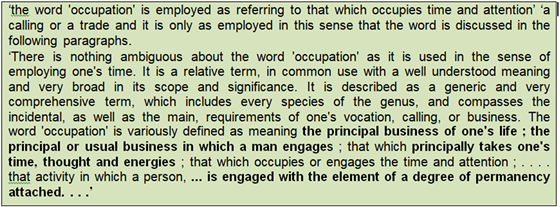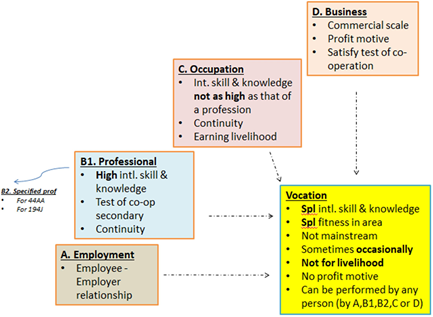In this article, I will be discussing the differences between the terms 'business', 'profession', 'vocation' and 'occupation' in the context of the Income Tax Act, 1961 (the Act). Understanding and identifying whether a particular organisation is a business or profession is very important because amongst other things section 44AA requires that specified professions have to mandatorily maintain books of account, if they are not opting or not eligible for opting for section 44ADA of the Act. Also, the turnover limits prescribed under section 44AB of the Act for getting the books of accounts audited is also different for business and profession.
INTRODUCTION
The Act has defined the term 'business' and 'profession' under section 2(13) and section 2(36) respectively as follows

On a plain reading of the above definitions, one thing we would have noticed is that there is a marked difference between the two terms, to the extent that, in the case of profession any adventure or concern is not included. A quick go-through of the above two terms gives an impression that profession appears to be more personalised one whereas business is perceived to be more an institutionalised one. However, in real-life scenario, we find several situations in which a professional person while carrying a profession has to setup a commercial concern and undertake adventure in the nature of commerce. There are some professionals who are doing individual practice and some professionals setup office, engages into partnership with other professionals, employs staffs, deploys capital and takes risk of certain fixed expense irrespective of the earnings from the professional activities. In such a scenario, whether we can say that he is doing a business (i.e commercialisation of professional activity) or is he still engaged in profession? Read on

MATERIAL SERVICE AND PROFESSIONAL SERVICE
Dictionary meaning of the word 'profession' is as follows

Professionals are those who are engaged in activities that require special and prolonged training and involve a higher level of education. 'Profession' was explained by the Honourable Supreme Court in Safdar Jung Hospital1 case. A profession ordinarily is an occupation requiring intellectual skill, often coupled with manual skill. Professional services cannot be described as material services. 'Material services' are those services that do not depend wholly or largely upon the contribution of professional knowledge, skill or dexterity for the production of a result. The service of professional men is easily distinguishable from an activity such as a transport service. The latter is of a commercial character.
'INDUSTRY' UNDER INDUSTRIAL DISPUTES ACT, 1947
An analysis of certain case laws on the term 'Industry' which have certain obligations to 'workmen' under Industrial Disputes Act, 1947 (IDA) can also throw light on the line of demarcation between the terms business and profession for the purpose of the Act.
The Honourable Madras High Court in Fraser and Ross, Chartered Accountant2 case held that Chartered Accountant cannot be termed as an 'Industry' within the definition of IDA. In this case, the respondent contended that Chartered Accountant firm constitute an 'Industry' within the meaning of IDA and proceeded for a claim of retrenchment compensation. The arguments and findings in this case relevant to this article is briefed below
Test of co-operation between capital and labour
The Honourable Court has also referred to Hospital Mazdoor3 case wherein it was held that hospitals are industry. In that case, the working test in determining whether any activity amounts to an industry is the co-operation between capital and labour or between employer and employee which must be direct and essential. The concept of industry postulates a partnership where the employer contributes his capital and the employees their labour and their joint contribution leads directly to the production or service. In hospitals, after medical treatment is determined by Doctor, an indoor patient needs all kinds of medical assistance until he is discharged and the hospital has been established to render various services till the discharge of patient and in rendering the said services employees of the hospital co-operate and play their part. That is how the hospitals satisfy the test of co- operation between employer and his employees. So whether in the case of a Chartered Accountant firm also there exist this co-operation and based on this whether it can be termed an 'Industry'? Read on
Learned and Liberal Profession
The argument of the respondent was that in Chartered Accountant firm also there exist intimate co-operation between Chartered Accountants and the staffs who carries out a great deal of routine work, without which the Chartered Accountant could not function at all. The Honourable Court felt that it is almost impossible to draw a line concerning the degree or quality of the co-operation between capital and labour from case to case. However the Honourable Court felt that in this case the entire argument really overlooks the actual organisation of the profession of Chartered Accountants and the equipment necessary for the practice of this profession being the intellect of Chartered Accountant and the quality of service rendered. All these features make this profession a learned profession. The service provided by a learned profession are primarily characterised by an equipment of learning, skill or judgment acquired through intellectual means.
The Honourable Court also referred to the case National Union of Commercial Enterprise4, wherein it was observed that a person following a liberal profession does not carry on his profession in any intelligible sense with the active co-operation of his employees and the principal capital which he brings into his profession is his special or peculiar intellectual and education equipment and liberal profession must be deemed to be outside the definition of 'Industry'. The Honourable Court also analysed amongst various other things the role of a Chartered Accountant under company law, the requirement to keep updated continuing tax
information, strict code of professional ethics under Chartered Accountant Act, 1949, the element of trust and confidence of the client on the Chartered Accountant.
The Honourable Court viewed that the argument of the respondent, that the work of a Chartered Accountant firm is largely made up of scriptory and clerical, that without the assistance of the clerks the audit report cannot be finalised and that though the report and certification of the balance sheet should be given by qualified auditor, the essential part of the main work which is to be performed prior to finalisation of such report is turned out only by the employee, is totally misleading, unacceptable and clearly misconceive the quality of service rendered by those following the estimable and intellectual profession of Chartered Accountancy.
SEMANTIC CHANGE
The dictionary meaning of the word 'vocation' is a person's job or profession. The dictionary meaning of the word 'occupation' is a job or profession, a regular activity or hobby.

On a combined reading of the above definitions, then what is the difference between profession, vocation and occupation or whether all are same? If profession, vocation and occupation are same whether activity carried out by carpenters, electricians, plumbers, painters are profession? Whether they are in the same basket as that of profession of legal, medical, profession of accountancy, Company Secretaries etc? Is that possible at all? No. Read on.
Semantic change means change in the meanings of the word over the course of time. The word 'nice' is used to 'compliment', whereas earlier its meaning was 'silly', 'foolish'. The word 'fathom' means 'to understand', whereas earlier it was used for 'a person's outstretched arms' which can be used as a measurement. eg. You can use a fathom line to measure the depth of water. The word 'girl' has nothing to do with gender 700 years ago. There is a visible shift nowadays to the usage of the word 'female actor' instead of 'actress'. (Source: Internet & Newspaper)
In the same way the general, natural and popular usage of the term business, profession, vocation, occupation has also undergone change.
VOCATION VERSUS OCCUPATION
The dictionary meaning of the word 'vocation' gives an impression that every activity including regular activities undertaken for earning livelihood are 'vocation' and in turn becomes a profession. However, that does not seems to be the intention of the Act. 'Vocation' is nowadays used for an activity done by a person where she has a special fitness, sometimes done occasionally, as hobby, or out of interest, out of inner urge and not mainly with the motive of making a profit and not as a means of livelihood.
The meaning of the word 'vocation' is explained in the case C.Rajagopalachariar5.

Any person carrying on a business or profession or even a person in employment can engage in vocation. A full time practising Chartered Accountant taking a seminar is a 'vocation'. A proprietor or partner of a business organisation writing articles/blog is a 'vocation'. A teacher who is in regular employment in an educational institution taking tuition class for children with a social motive though collecting some fees is a 'vocation'. Singers are professionals. But if they perform as judges in a reality show, it is a 'vocation'. So from the above, one can infer that it may be this reason of application of special skill and knowledge by a person engaged in business or profession or employment, that the term 'profession and 'vocation' are kept in the same basket under the definition of the Act. Even in trading, manufacturing and in provision of material services also there are application of skill and knowledge, but they are categorised as business apart from profession which required specialised skill and knowledge gained from prolonged training and education.
Then what is occupation? The regular and natural usage of the word 'occupation' is for an activity or job in which a person is occupied. An occupation is a type of job generally with some similar tasks and need similar training.
In Corpus Juris Secundum, (an encyclopedia of United States law at the federal and state levels), the word 'occupation' is defined as under

In Websters Third New International dictionary,

From the above we can infer that activities undertaken by, say carpentering, tailoring, haircutting, undertaken on a small scale for earning livelihood, though it cannot be reasonably termed as a 'business' in normal parlance are the 'occupation' undertaken by that person, which in turn are 'business' for the purpose of the Act.
COMPANY CANNOT BE A PROFESSION
In Ashalok Nursing Home (P) Ltd6 case, it was held that a company being an artificial person does not have a mind or a body and therefore cannot be engaged in any profession. The skill involved in carrying out professional activity is predominantly mental or intellectual rather than physical or manual.
DIRECT TAX CODE – BUSINESS INCLUDES PROFESSION
The definition of the term 'business' under section 2(4) of the Indian Income Tax Act, 1922, was exactly the same as that of section 2(13) of the current Income Tax Act, 1961. There was no definition for 'profession' under Indian Income Tax Act, 1922. However Income Tax Act, 1961 gave a separate definition for 'profession' under section 2(36) which includes vocation also. Clause 314(37) of Direct Tax Code Bill 2010, has interpreted 'Business' as

Direct Tax Code has brought the term 'profession' and 'vocation' within the ambit of 'business'.
ORGANISATION STRUCTURE TO UNDERSTAND PROFESSION
A professional activity when undertaken on a commercial scale is a business. Based on the judgement in Fraser and Ross case, we can come to the conclusion that a Chartered Accountant whether practising individually or with the help of assistants is a profession due to the reason that it is predominantly a learned profession wherein the primary capital is his intellectual and professional skill. The co-operation of employer and employee, though indispensable part, is secondary. Organisational structure can also throw some light as to whether an organisation is a business or a learned profession.
The following is a typical organisational structure of a Chartered Accountant firm.

In any learned professional firm which generally require more of mental and intellectual skill rather than manual repeated activities, there is a limit with respect to the number of direct reporting sub-ordinates a professional can manage. Since a Chartered Accountant cannot directly overlook the works of individual staff, she has created a span of control like the way done in the above organisational structure. Though there is an office setup, with employment of staffs, deployment of capital and involvement of risk of certain fixed expenses, it is not a commercial organisation.
The following is a typical organisational structure, where professional activity is carried out on a commercial scale.

Here the operational department is one among the other departments like marketing, technical and finance. In current market scenario, we have seen a lot of commercial entities; say in the case of accountancy profession, which are assisting in professional activities using the help of technologies and artificial intelligence. They undertake mass marketing activities, charge fixed fees primarily on quantitative criteria rather than qualitative criterion, generally undertake those professional activities where the requirement of professional judgement is comparatively not as higher as required and applied by a full-fledged professional organisation. Those entities are engaged in the commercialisation of professional activities and in turn 'business'.
The above organisation structures are just for illustrative purpose. The real judgement differ from case to case depending upon the number and types of skilled, unskilled, trained and professional men employed in various departments and the level of roles played by those departments.
SUMMARY

CONCLUSION
Both business and profession are inclusive definitions. Inclusive definition expands the meaning of the words defined and at the same time it is not meant to prevent the word receiving its ordinary, popular and natural sense. A combined analysis of the inclusion of the words in the definition of business and profession gives a sense of the intention of law to categorise trading, manufacturing and material services including occupation as 'business' and wherever there is a usage of high intellectual skill and special knowledge, it is a 'profession'. Simply because of the fact that there is some application of skill and knowledge in a business does not make it a profession and simply because of the fact that there is some adventure or concern in a profession does not make the same a business. Just like a famous proverb, 'one swallow does not make a summer'. A single plunge by a business into the waters of profession does not amount to profession and vice versa. Dictionary meaning can give a guide and cannot always give a clear demarcation of the words defined. A logical interpretation of the words has to be based on the purpose and object of the provisions on case to case basis and not to make a fortress out of the dictionary meaning alone. The content of this article is the personal views of the author as a knowledge sharing initiative for discussion purpose and not professional advice and author assumes no responsibility for use of this information.
- The Management of SafdarJung Hospital v Kuldip Singh Sethi 1970 AIR
- Fraser and Ross, Chartered Accountant v Sambasiva Iyer and Another Writ Petition 222 of 1966 (Mad)
- State of Bombay & Others v The Hospital Mazdoor Sabha AIR 1960 SC 610
- National Union of Commercial Employees and Another v R.Meher, Industrial Tribunal Bombay and others [1962] 22 AIR SC 1080
- Rajagopalachariar v. CIT [1963] 50 ITR 196 (Mad.)
- Income Tax officer, Ward 37(4) v. Ashalok Nursing Home (P) Ltd [2006] 9 SOT 61 (Delhi) (URO)
The author can also be reached at sivaraman004@gmail.com








 CAclubindia
CAclubindia
